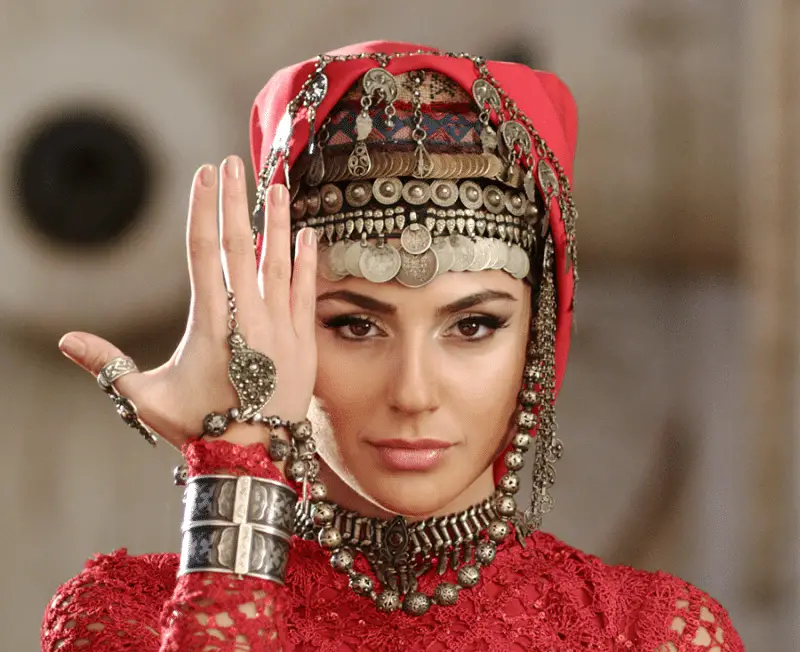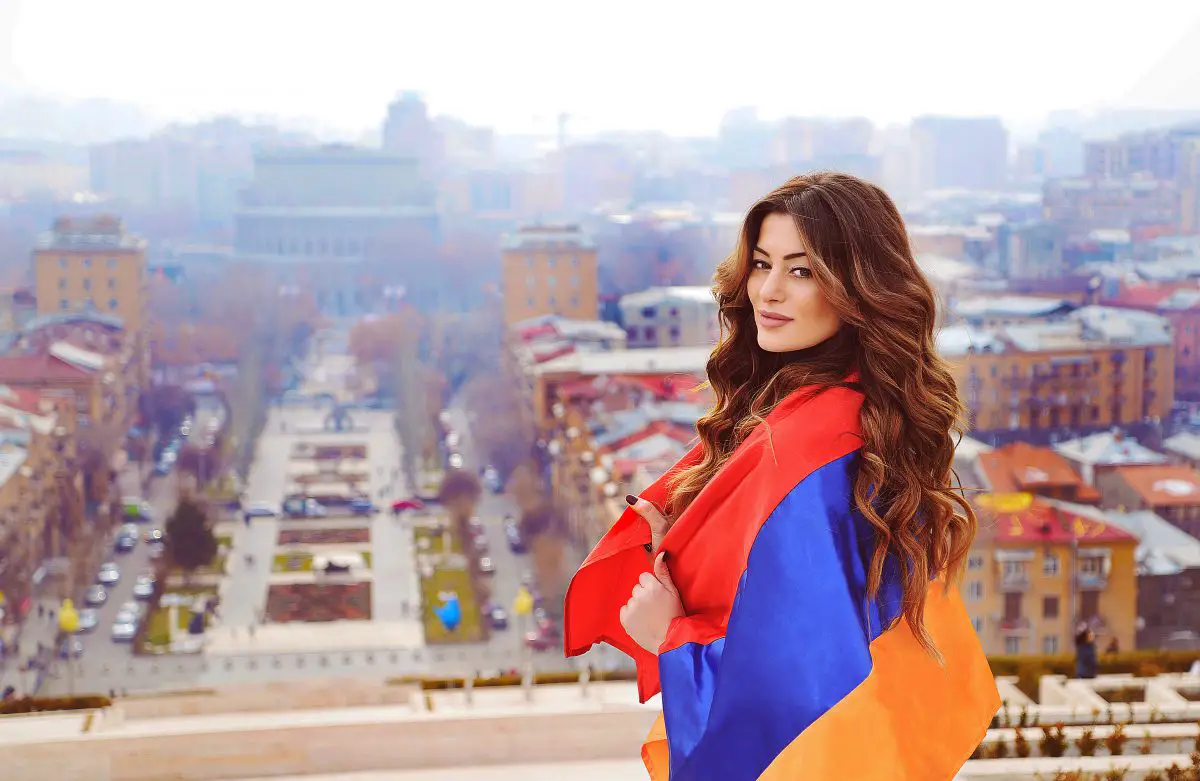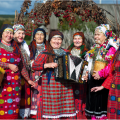Siranush Harutyunyan (Սիրանուշ Հարությունյան) was born in Yerevan, Armenia in 1987 into a family of entertainers. Professionally, she goes by a shortened version of her first name, Sirusho (Սիրուշո).
Both Sirusho’s parents hold the title of Honored Artist of Armenia – her mother was one of Armenia’s most popular singers in the 1980s and 1990s, and her father is a renowned actor and director. From age seven she began to write her own songs in Armenian and English, and won her first award at age nine for a performance of the early 20th century folk song “Lusabats.” She soon adopted the stage name Sirusho (an affectionate nickname of Siranush), and released her first studio album, the self-titled Sirusho at age 13. Sirusho studied piano at Yerevan’s Sayat-Nova Music School, and graduated from Yerevan State University with a degree in international relations. In 2005, her folk music album Sheram (Շերամի) won Best Album at the Armenian National Music Awards.
In 2008 she stepped onto the international stage, representing Armenia in the Eurovision Song Contest with the song “Come, Come” (Qele, Qele / Քելե, քելե). The pop stylization of a traditional folk song would become her signature. “Come, Come” was a megahit in Armenia, and remixes received heavy rotation in dance clubs throughout the Armenian and, interestingly, the Greek-speaking world. Her 2011 song “I Like It” represented a foray into the English language, but was met with lukewarm reception.
Sirusho’s strength is in the incorporation of folk influences and national identity. Many of her songs have a strong nationalist flair, and she often performs in elaborate traditional costumes. Several of her music videos focus on her dramatic costumes, including slow motion shots of Sirusho putting on a heavy coin-trimmed headdress, or dancing in a traditional-meets-contemporary style, kicking up a long, shoulder-padded cloak around her. In 2012, she launched a line of traditionally-inspired handcrafted silver jewelry, timed to coincide with the release of her wildly popular single of the same name as her jewelry line – “PreGomesh” (ՊռեԳոմեշ). The track won the 2013 Armenian Music Award for Best Performance, and was nominated for two World Music Awards the next year. PreGomesh is tough to translate as “pre” is a sound specifically used by Armenian shepherds to bring in animals. Gomesh can generally refer to any hooved animal. Inspired by the folk song “Lovra Gutanerg” (Լոռուայ գութաներգ) by the father of Armenian national music, Komitas, the song imitates the call of buffalo herders “ar-ha” and “pre-re.”
A more controversial song is the 2015 “Where Were You,” released on the 100 year anniversary of the Armenian Genocide. The video clip plays English and Armenian language versions one after the other, and has Sirusho flashing between the modern day, the ruins of an Armenian Orthodox cathedral dressed in 19th-20th century aristocratic mourning clothing, performing amongst a black-clad dance troupe, and a smoky battle scene. The video also includes photos of Armenian people at the time of the genocide and shots of 21st century protesters trying to raise awareness of the event. A teaser for her soon-to-be-released “Zartonk” (Awakening) shows Sirusho sitting amongst a group of military men, all dressed in camouflage fatigues, clapping along as an older man sings a folk song. The audio track, released on September 15th, 2016, is drum-heavy and filled with choral shouts reminiscent of battle cries.
Here is here mega-hit “PreGomesh” (ՊռեԳոմեշ):
Lyrics for “ՊռեԳոմեշ”:
Ել ու թող իմանա աշխարհը,
Որ արդար է քո ճանապարհը,
Ել ու թող, որ ազնիվ կռիվդ,
Երկնքում հաստատի պատիվդ:
Պռե՛գոմեշ
Ա՛ռ հա՛ գոմեշ
Պռե՛րե՛ գոմեշ
Ա՛ռ հա՛ գոմեշ
Տա՛ր հա՛ գոմեշ
Պռե՛րե՛ գոմեշ
Նա անհնազանդ է ու քար,
Աչքերում ապրում է լուռ պայքար,
Կյանքը հողի հետ մենամարտ,
Հաղթահարում է իր հոգով անպարտ:
Մեկն է բնության օրենքը
Կամքն ուժեղ գտնում է ելքը
Ու շարունակում տալ սերունդներ,
Մեկն է բնության պահանջը,
Որ մտքից հանի նահանջը
Չի կարող երբեք նա հանձնվել…
Ել ու թող իմանա աշխարհը,
Որ արդար է քո ճանապարհը,
Ել ու թող, որ ազնիվ կռիվդ,
Երկնքում հաստատի պատիվդ:
Պռե՛գոմեշ
Ա՛ռ հա՛ գոմեշ
Պռե՛րե՛ գոմեշ
Ա՛ռ հա՛ գոմեշ
Տա՛ր հա՛ գոմեշ
Պռե՛րե՛ գոմեշ
Ցավն են անցկացնում դանդաղ
Սարերից հոսող ջրերը պաղ,
Տաք արյունը գույնն է բախտի
Բռնած ուղիդ ոչինչ էլ չի խախտի…
An earlier hit was “He’s Worthy” (Arjani E / ԱՐԺԱՆԻ Է):
Lyrics for “ԱՐԺԱՆԻ Է”:
Արժանի է նա միայն սիրո
Դու սպասում ես,որ նա գա,
Կուշանա,բայց կզղջա
Հասկացիր ու դու ներիր նրան
Թե նա հանկարծ չգա,
Մի տխրիր կորցնում ե նա
Արժանի ես դու միայն սիրո:
Թե նա հեռացել է
Ու քեզ նեղացրել է
Թե սիրտդ կոտրել է
Մոռացիր նրան,
Բայց թե քեզ սիրել է
Սիրտ ու սեր տվել է
Քեզ համար ապրել է
Դու նրան պահիր,
Արժանի է նա միայն սիրո:
Դու ապրում ես սպասելով
Սիրում ես ատելով
Խաբում ես քեզ երազներով
Քտիր մեկին որ քեզ սիրի
Իր կյանքից էլ ավելի
Արժանի լինենք միայն սիրո
This entry was written by SRAS Graduate Samantha Guthrie from the University of Virginia, class of 2016. She is a double major in Foreign Affairs and Russian and Eastern European Studies. A Boren Scholarship recipient, she plans to work for the US government in a career related to national defense intelligence or international aid. Her research focuses on the relationship between Russians and Caucasians. She spent spring and summer 2014 in St. Petersburg with SRAS Russian Studies Abroad and Russian as a Second Language.











